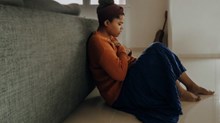Trusting in the God Who Sees

As stewards of grace involved in Kingdom work, we can become overwhelmed at the magnitude of the needs surrounding us. We see injustices and abuses of power—and the wounds they create—and our flesh reacts. Too often, we either work ourselves to the point of exhaustion to try and change things, or we are tempted to become angry and cynical. We wonder, does God see what’s happening? Does He hear our cries, or the cries of the oppressed?
I’ve been there. Over the last thirty years, I’ve dealt with chronic pain and other physical challenges from two autoimmune diseases. So far, though God is faithful to sustain and strengthen me, He has not chosen to heal me. Also, several years ago, my youngest son began experiencing chronic pain. That was almost harder than living with my own limitations (and the emotional and spiritual struggles that come along with invisible illnesses).
Because of my journey, one of my favorite women in the Bible is Hagar. She was a slave from Egypt, whom Sarah gave to Abraham to try and produce an heir. And although the practice of using a servant to circumvent barrenness was accepted in biblical times, the relationship between the two women was fraught.
God Sees
Once Hagar became pregnant, the tensions between the two boiled over and Hagar ran away from Sarah and Abraham, into the desert. In the midst of a dry, barren wilderness, Hagar’s desperation was met with God’s presence and sustenance. She saw her Creator for who He was, becoming the only biblical woman to give God a name: “El Roi” (the God who sees me). Then God gave her a tough command: return to her mistress.
Hagar submitted to God and returned to Sarah, but that wasn’t the end of her story. She gave birth to a son, Ishmael, and remained a faithful servant to her masters. During the next ten years, she witnessed the fulfillment of God’s promise in the birth of Isaac to Sarah and Abraham.
However, when Ishmael taunted Isaac, Sarah’s anger took over, and she told Abraham to get rid of “that slave woman and her son.” Once again, Hagar ended up in the desert. This time, however, she didn’t leave of her own volition.
Sitting in the dust of the desert, Hagar experienced desolation. Out of water and hope, she began to weep, believing she and her child would die.
Then God, who watched His only Son hang naked—in extreme thirst—on the cross, heard. In compassion and mercy, God opened Hagar’s eyes, and she found a well.
God hears
This story reminds us that God hears our cries—and our children’s cries. In fact, He hears the cries of every mother in every hunger-stricken home. He sees the pain of the trafficked and abused, oppressed and maligned. And one day, His justice will reign.
“El Roi” filled Hagar and her son with physical water, meeting their immediate needs. Then, He protected them and guided them, meeting their long-term needs.
He promises to do the same for us.
Until then, we partner with Him as light-bearers and water-givers, knowing He has called us to not turn away from suffering but to enter into it, as Jesus did.
If we live with ears tuned to the Spirit’s voice, and eyes open to see His workings in the world, each day will unfold in startling ways. Eventually, like Hagar, when we see Him clearly, we can work for Him without feeling as if it’s all up to us. We’ll no longer be held captive by cynicism or despair; instead, we’ll be infused with hope and filled with peace. Our lives will become a living, dynamic portrait of God’s presence, promises, and power.
Something else I love about Hagar’s story: the first time she fled from Sarah and Abraham’s camp, she left as a slave. The second time she journeyed out of the camp, through no fault of her own, she left with her freedom. No more would she answer to an earthly master; she belonged to God alone.
While you and I journey toward the ultimate freedom of eternity and the redemption of all things, we can trust El Roi, the God who hears and sees.
Dena Dyer is a professional author, speaker, and Bible teacher, as well as the author or co-author of twelve books and hundreds of articles. She serves as Communications Specialist for Wheaton’s Humanitarian Disaster Institute. The book this devotional was adapted from—Wounded Women of the Bible: Finding Hope When Life Hurts—was named the Golden Scroll Non-Fiction Book of the Year in 2014 and was a finalist in Serious Writer’s 2020 “Book of the Decade” Contest.
The Better Samaritan is a part of CT's
Blog Forum. Support the work of CT.
Subscribe and get one year free.
The views of the blogger do not necessarily reflect those of Christianity Today.





















